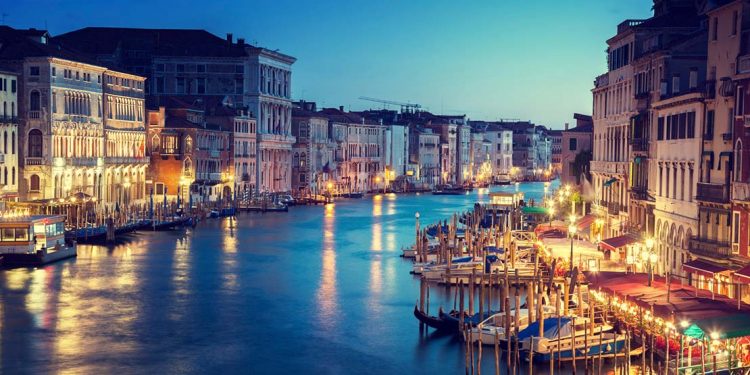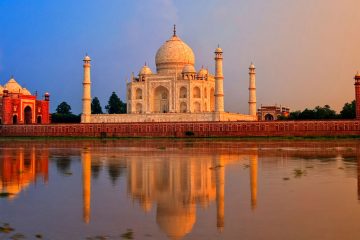
Get There Before It’s Too Late
The face of the planet is changing. Between the effects of rapidly rising global temperatures, increasing populations and sheer neglect, there are a number of places around the world that are being pushed to the brink of destruction.
The Bahamas and that cruise can wait. You don’t want to realize you waited to visit some of these breathtaking locations when it’s too late.
Re-order your bucket list and start planning your trip! The time is now to travel to these historic sites and landmarks of legendary natural beauty. Here are the places to visit before they disappear forever.
Venice
Venice is a city built on faded dreams and borrowed time. The city has been sinking for centuries now, which is scarcely surprising considering the improbable construction of stone houses and marble palazzi built above a salt marsh.
The wooden pilings the city is built on have been sinking deeper into the mud since the city was born, but now there is a new threat to Venice’s existence above water. Rising sea levels have brought higher tides, triggering flooding, evacuations and the fear that Venice is drowning.
The time to visit is now, before Venice’s foundations crumble completely and the city of gondolas and romance succumbs to the sea.
Glacier National Park, Montana
Around the world, glaciers are vanishing into warm air. Nowhere is this more noticeable than in the national park that gets its name from the great rivers of ice.
Montana’s Glacier National Park tops the lists of places you must visit before it’s too late. Once, the glaciers in the park numbered more than 150. Today, less than 25 remain, and with a consistent increase in temperatures these are predicted to disappear within the next decade.
There is no better time than the present to explore the hundreds of miles of hiking trails in the park, and take in the glory of the remaining glaciers.
Looking for a getaway with your significant other? These couples resorts have it all, in some of the most gorgeous settings in the world.
The Dead Sea
The Dead Sea is at risk of becoming truly deceased. The lowest elevation on Earth, the Dead Sea (actually a lake) is a natural marvel that offers travelers from around the world the chance to experience the eerie sensation of floating weightlessly in its salty waters.
Sadly, it is shrinking slowly but surely into oblivion. Billions of gallons of water are being diverted from the Dead Sea’s main water source, the Jordan River.
With significantly less water now making its way into the lake, the waters are receding by about 3 feet every year. Soon the Dead Sea may be a Dead Desert.
Taj Mahal
3 million people visit the Taj Mahal every year to catch a glimpse of the world’s most beautiful mausoleum rising out of the dawn mist. The elaborate tribute to love is not eternal however, and is under threat of irreversible damage from air pollution, poor restoration, population growth and of course the staggering number of visitors who pass through the gates each year.
The palace’s exterior is eroding slowly, prompting UNESCO and other preservation groups to call for the closure of the Taj Mahal to visitors. If you dream of seeing the exquisite beauty of this structure up close, better get in quick.
Pyramids of Giza
Cairo’s unrestrained development means that urban sprawl and squalor is encroaching rapidly on the Ancient Wonder that is the Pyramids of Giza. Sewage from the creeping slums is weakening the plateau on which the pyramids stand, while air pollution attacks the exteriors from above.
There are few restrictions to prevent visitors from clambering around and over the historic landmarks, a fact which is also contributing to their decay. Fears are growing that soon the pyramids will be lost to over-development and rampant tourism, or to simple collapse.
Hurry if you want to see them — but don’t be one of those visitors that shows complete disrespect for the magnificent constructions.
Kids of all ages and adults are sure to love to a Hawaii family vacation. From getting there, to attractions, to cost we have your trip planning covered!
Seychelles
A playground of luxury resorts and idyllic island beaches, the Seychelles are a dream destination for many sun-starved office workers. However, escaping to the white sands and blue waters of the Seychelles might not be an option for much longer— climate change has caused this paradisaical archipelago to be added to the list of disappearing landmarks.
Beach erosion and coral die-off are threatening the very existence of the Seychelles, and it has been estimated that all of the 115 islands could be fully submerged within the next 50 years.
The Great Wall of China
The greatest thing ever built by human hands, the Great Wall is unfortunately not impervious to natural erosion and not-so-natural theft of bricks. As much as one-third of the wall has already been eradicated by harsh conditions and disregard for the value of the ancient construction.
Although it can only be expected that the wall will crumble in places (it is thousands of years old, after all) tourism and the reckless behavior of locals are also having a hefty impact on the Great Wall. If these activities continue, the Great Wall will merely be another place that will disappear soon as the remaining sections of the wall may eventually melt away, leaving nothing but scattered rubble behind.
Bonus tip: If you want to experience portions of the wall that have more “untouched” quality and fewer tourists milling about, there’s an adventure vacation for that. You’ll be able to take a hike to more remote locations along the wall.
The Maldives
It is hardly surprising that the lowest-lying country on the planet is pegged as one of the first to go underwater. With the hundreds of islands sitting just feet above sea level, rising sea waters are threatening the future of the Maldives.
So much so that the government is reportedly looking at purchasing land in other countries to give their citizens a place to live when the sea finally swallows up the islands. Better bump a visit to these islands up your bucket list to get in a trip before they are gone forever.
It's time to book your tickets and start daydreaming of being far away having enriching life experiences. Here are the top travel destinations for 2017!
Kilimanjaro’s Icy Cap
Ice has no place in a world that is slowly heating up. The icy summit of Kilimanjaro is quietly slipping away, and within 20 years the mountain may stand naked.
The iconic Kilimanjaro, rising bold and alone from Africa’s grasslands, is famed for its snowy peak. It makes a striking sight against a hot, blue African sky, so it is no wonder that it is one of the continent’s most recognizable landmarks.
One-third of the ice cap has vanished into thin air in the last decade, so if the blanket of white on the Roof of Africa is a sight you dream of seeing, don’t wait much longer.
The Great Barrier Reef
Iconic, beautiful, wondrous and dying. Australia’s Great Barrier Reef, the largest reef system in the world and one of the most bio-diverse spots on the entire planet, is in hot water.
After 7,000 years in existence, rising ocean temperatures, human activity and water pollution are finally irreparably eroding the reef. Coral-bleaching is now widespread throughout the once-vibrant living structure, the most visible symptom of the poor health of the Great Barrier.
The environmental challenges faced by this gigantic underwater world could see it erased forever within a matter of decades.
